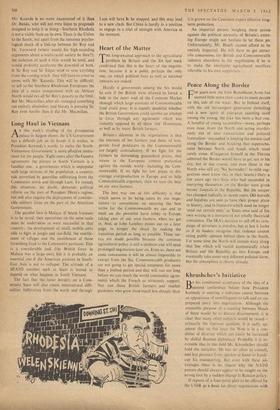Peace Along the Border .
Coe years now the Irish Republican Army has
seemed little more than a joke to many people on this, side of the water. But in Ireland itself, with the old intransigent veneration dwindling and a new spirit of tolerance asserting itself among the young, the joke has been a bad one. A handful of young nationalists—many, perhaps even most, from the North and acting murder- ously out of sour romanticism and political frustration—succeeded in keeping the tension taut along the Border and blocking that rapproche- ment between North and South which must surely come. (Craigavon himself in the Thirties admitted the Border would have to go; not in his day, but in due course: and even those in the North who still cry 'No Surrender!' to mild sug- gestions must know this in their hearts.) Only a few years ago two boys who had succeeded in martyring themselves on the Border were given heroes' funerals in the Republic. But the temper has changed radically in recent years. Old hatreds and loyalties are seen to have their proper place in history, and in literature• which need no longer 'send out certain men,' as Yeats once said of his own writing in a moment of not wholly theatrical conscience. The IRA's decision to call off its cam- paign, of terrorism is overdue, but at last it looks as if its leaders recognise that violence cannot swing public opinion behind them in the South. For some time the North will remain wary along that line which will vanish economically when Britain and the Republic go into Europe and eventually take some very different political form. But the atmosphere is clearer already.


































 Previous page
Previous page